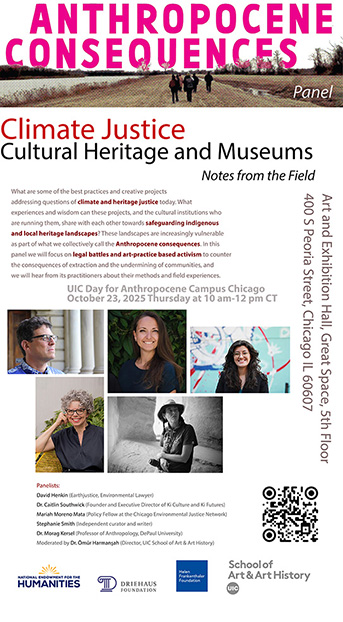NEH Climate Resilience Project

What are some of the best practices and creative projects addressing questions of climate and heritage justice today? What experiences and wisdom can these projects, and the cultural institutions who are running them, share with each other towards safeguarding Indigenous and local heritage landscapes? These landscapes are increasingly vulnerable as part of what we collectively call the Anthropocene consequences. In this panel, we will focus on legal battles and art-practice-based activism to counter the consequences of extraction and the undermining of communities, and we will hear from its practitioners about their methods and field experiences.
Registration: ac-chicago.org
Panelists
Mariah Moreno Mata
Mariah Moreno Mata is a policy fellow for the Chicago Environmental Justice Network (CEJN) that encompasses five environmental justice organizations on the south and southwest side of Chicago (Little Village Environmental Justice Organization, People for Community Recovery, Southeast Environmental Task Force, Neighbors for Environmental Justice, and Blacks in Green). Mariah graduated from Chicago-Kent College of Law in 2022 and received her Environmental and Energy Law Certificate. She then worked as a law clerk at the Greater Chicago Legal Clinic until 2024, focusing on environmental justice cases that resulted in more stringent requirements for demolitions in the city of Chicago, ensuring that a botched implosion similar to the Hilco disaster in Little Village would not happen again. Mariah also conducted extensive historical research on Collateral Channel, leading to a CERCLA 9605-d petition addressing potential hazardous substances near community residents, parks, and schools. Currently, she is advocating for the Hazel M. Johnson Cumulative Impacts Ordinance, which would require the City to consider the cumulative effects of health and industrial factors before allowing new heavy industry into a community.
Caitlin Southwick (PD, MSc)
Caitlin Southwick is the Founder of Ki Culture and Ki Futures and an international thought leader, trainer, and speaker on sustainability for museums. A trained art conservator, she has worked at cultural sites around the world, including the Vatican Museums, the Getty Conservation Institute, the Uffizi Galleries, and Rapa Nui. Caitlin’s work centers on how museums must confront both environmental and cultural forms of extraction—from high energy consumption in climate control to the hoarding of cultural belongings. Drawing on case studies from Ki programming, she discusses how museums can align environmental responsibility with heritage justice, supporting both climate resilience and social justice. She argues that conservation can no longer justify outdated practices and demonstrates how sustainable approaches in collections care, climate adaptation, decolonization, and repatriation can advance heritage justice.
David Henkin
David Henkin is an attorney in the Mid-Pacific Office of Earthjustice in Honolulu. For the past 30 years, he has litigated cases across the Pacific on behalf of Indigenous communities seeking to preserve and deepen their relationships with cultural landscapes threatened by climate change, commercial fishing, and military training. Drawing from case studies—including opposing military live-fire training in a sacred valley on O‘ahu and challenging commercial fishing in the Pacific Remote Islands—David examines the imperfect match between Indigenous communities’ desire to protect cultural heritage and the legal tools available, which often prioritize biological preservation over cultural significance.
Stephanie Smith
Stephanie Smith will share insights from an ongoing collaboration with artists, scientists, and knowledge keepers addressing the interlinked problems of Indigenous displacement and the logging of primary forests on Vancouver Island, British Columbia. This ground-up experiment in co-learning, resistance, and regeneration has mostly occurred outside traditional cultural institutions. Her talk centers on work alongside artists Makwala-Rande Cook, Lindsay Katsitsakatste Delaronde, Kelly Richardson, and Paul Walde, in dialogue with the Awi’nakola Foundation and forest ecologist Suzanne Simard’s Mother Tree Project.
Morag Kersel
Morag Kersel explores the intersection of heritage justice, cultural diplomacy, and activist archaeology in responding to contemporary threats to cultural heritage. By situating heritage within frameworks of diplomacy and human rights, she highlights efforts to redress historical dispossession and resist ongoing cultural and political exploitation. Using the U.S. State Department’s process for negotiating cultural property Memoranda of Understanding as an example of archaeological advocacy in action, Morag examines how archaeologists can move beyond excavation and documentation to embrace advocacy. She argues that activist archaeological practice can drive policy, shape international practice, and foster equitable partnerships with affected communities, institutions, and objects.
